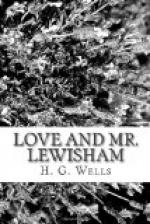That red tie was indeed but one outward and visible sign of much inward and spiritual development. Lewisham, in spite of the demands of a studious career, had read his Butler’s Analogy through by this time, and some other books; he had argued, had had doubts, and called upon God for “Faith” in the silence of the night—“Faith” to be delivered immediately if Mr. Lewisham’s patronage was valued, and which nevertheless was not so delivered.... And his conception of his destiny in this world was no longer an avenue of examinations to a remote Bar and political eminence “in the Liberal interest (D.V.)” He had begun to realise certain aspects of our social order that Whortley did not demonstrate, begun to feel something of the dull stress deepening to absolute wretchedness and pain, which is the colour of so much human life in modern London. One vivid contrast hung in his mind symbolical. On the one hand were the coalies of the Westbourne Park yards, on strike and gaunt and hungry, children begging in the black slush, and starving loungers outside a soup kitchen; and on the other, Westbourne Grove, two streets further, a blazing array of crowded shops, a stirring traffic of cabs and carriages, and such a spate of spending that a tired student in leaky boots and graceless clothes hurrying home was continually impeded in the whirl of skirts and parcels and sweetly pretty womanliness. No doubt the tired student’s own inglorious sensations pointed the moral. But that was only one of a perpetually recurring series of vivid approximations.
Lewisham had a strong persuasion, an instinct it may be, that human beings should not be happy while others near them were wretched, and this gay glitter of prosperity had touched him with a sense of crime. He still believed people were responsible for their own lives; in those days he had still to gauge the possibilities of moral stupidity in himself and his fellow-men. He happened upon “Progress and Poverty” just then, and some casual numbers of the “Commonweal,” and it was only too easy to accept the theory of cunning plotting capitalists and landowners, and faultless, righteous, martyr workers. He became a Socialist forthwith. The necessity to do something at once to manifest the new faith that was in him was naturally urgent. So he went out and (historical moment) bought that red tie!
“Blood colour, please,” said Lewisham meekly to the young lady at the counter.
“What colour?” said the young lady at the counter, sharply.
“A bright scarlet, please,” said Lewisham, blushing. And he spent the best part of the evening and much of his temper in finding out how to tie this into a neat bow. It was a plunge into novel handicraft—for previously he had been accustomed to made-up ties.
So it was that Lewisham proclaimed the Social Revolution. The first time that symbol went abroad a string of stalwart policemen were walking in single file along the Brompton Road. In the opposite direction marched Lewisham. He began to hum. He passed the policemen with a significant eye and humming the Marseillaise....




